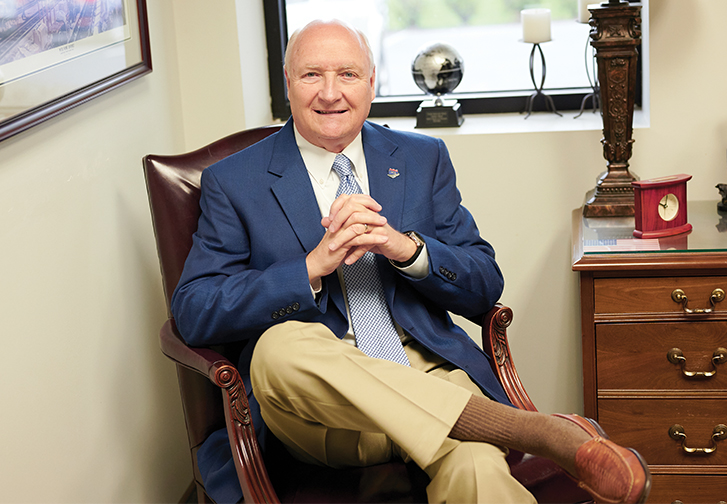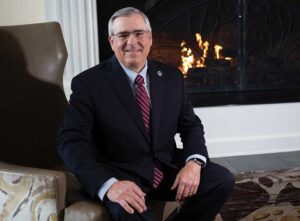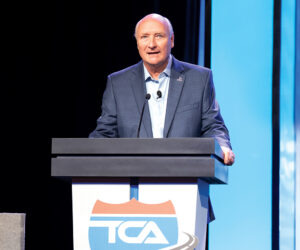It’s been a little more than two months since the Truckload Carriers Association’s (TCA) Chairman Jim Ward took office, and he’s been on the go ever since, traveling to Indiana to celebrate the life of former Chairman Tom Schilli, visiting TCA members in Tennessee, holding a town hall meeting with past chairmen, and participating in the association’s Safety and Security Meeting in St. Louis. Think a short break might be in order? No way. There are upcoming meetings with the executive teams of both TCA and the American Trucking Associations, a webinar panel on the role of the shipper in driver retention, both before TCA’s Refrigerated Division Meeting in Albuquerque, New Mexico, and hosting the annual TCA Officer’s Planning meeting in late July. In addition to talking about his busy agenda, Chairman Ward took time to talk about safety, large truck fatality statistics, whether there is hope for an infrastructure plan, and the significance of the fracture on the Interstate 40 bridge that is costing the trucking industry an estimated $2 million a day.
As we conduct this interview, you’ve just completed your first six weeks as chairman. Will you share with our readers what that experience meant to you and some of the things you’ve accomplished during that short time frame?
The first six weeks went by rapidly. The week after I accepted the gavel from Dennis Dellinger, John Lyboldt and I traveled to Remington, Indiana, for Past Chairman Tom Schilli’s celebration of life. Tom was passionate about TCA and sported his chairman’s green jacket proudly. He was a gracious contributor to the TCA Scholarship Fund, which provides financial support to our members who pursue higher education. We also visited with a fairly new member, Venture Logistics, as well as DriverReach.
I spent the early part of Week 4 in Chattanooga, Tennessee, with John, visiting members and prospective members. It’s interesting to learn about their businesses and have the opportunity to discuss the value they would receive from their TCA membership.
In Week 5 we held the first Past Chairman’s Town Hall Zoom meeting. The purpose of the meeting was to inform the past chairmen of the activities planned for 2021-22, and to share with them how well TCA has weathered the pandemic, both financially and with membership. I believe it is important to keep those who have led the association over the years informed and engaged in our future.
Then it was off to the association’s Safety and Security Meeting, highlighting the No. 1 priority of our industry. This year, the meeting was held in St. Louis, with the best attendance we’ve experienced since 2014. We were extremely disappointed that our Canadian members and friends did not join us because of pandemic border restrictions; however, we recorded the event so they can review the information at their leisure.
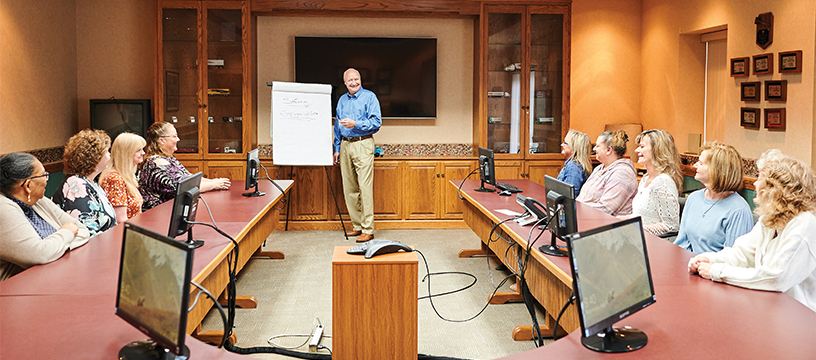
What is your agenda for the next couple of months?
We held a field day June 10 at Don and Mary Bowman’s home for the TCA and American Trucking Associations executive teams. We spent an afternoon of fun and fellowship following a light lunch, a tour of Don’s antique car museum, and offered everyone an opportunity to drive a truck in the open field. It was a great afternoon.
On June 23, I had the privilege of moderating a webinar panel titled The Critical Role of the Shipper in Driver Retention. This is an honor and continuation of my days as chair of the Carrier/Shipper Relations Committee when we developed the Voluntary Guide to Good Business Relations for Shippers, Receivers, Carriers, and Drivers under the leadership of the late TCA Chairman Tom Kretsinger.
In mid-July, Starla and I will be attending TCA’s Refrigerated Division Meeting in Albuquerque, New Mexico, before hosting this year’s Officers Planning Meeting in Annapolis, Maryland. I have enjoyed every minute of my time in this role thus far, and it’s just getting started for the two of us.
After a year of virtual meetings, the Truckload Carriers Association recently held its first in-person meeting since the 2020 annual convention with the Safety and Security meeting in St. Louis the first full week in June. How did it feel to be “back in the saddle” and on the road again, so to speak?
A lot like Willie Nelson’s classic song “On the Road Again,” it’s great!
The annual convention covers a wide variety of topics. The Safety and Security Meeting covers only two. What is the significance of hosting an in-depth discussion of safety and security?
Safety is where I cut my teeth in the industry, so I have experienced firsthand the importance of personnel selection, training, behavior modification, risk mitigation and developing processes that can be repeated to produce favorable results. This sounds easy but requires an uncompromising commitment of everyone in the organization to achieve the desired outcome. The companies who make the investment in their personnel to send them to these meetings to hear and discuss topics such as technology advancements, data analysis, priorities, vulnerabilities, prevention mitigation strategies, desire to be the best in class, and I want to surround myself with and learn from them.
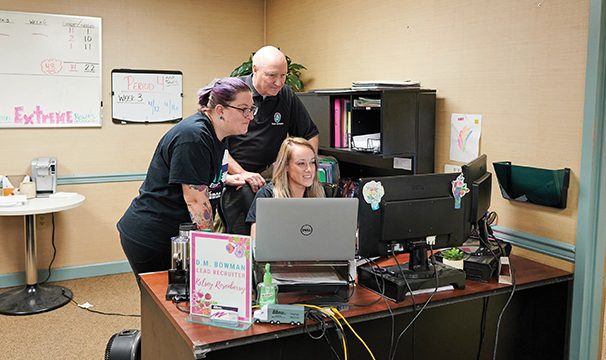
The latest preliminary large truck fatalities statistics show a decline in 2020 following an increase the three previous years. Some might attribute the decline to less traffic during the stay-at-home order during the COVID-19 pandemic, but regardless, how can trucking use the 2020 decline as a starting point for continued declines in fatality statistics?
Yes, less traffic and reduced exposure was certainly a key aspect in the decline of large truck fatalities in 2020. In knowing that, it is important to continue our advocacy efforts in Washington to get an infrastructure package passed that contains real money to support rebuilding our roads and bridges. Simply put, the decline in accidents is related to the very fact that fewer cars were on the road. Committing dollars to infrastructure would help alleviate high congestion points with not only fixes to the current highway system, but also the ability to build and sustain new roads and bridges that would aid in the delivering freight safely and efficiently.
Since you became chairman, President Joe Biden’s administration has long passed its 100-day mark, but there has been little positive movement on his infrastructure plan. Do you anticipate any forward movement in the next 60 days? Why or why not?
Well, I think it is fair to say that this is actually the closest we have gotten to an infrastructure deal in the years that it has been on the front burner as a campaign issue. The conversations that TCA has been part of have been fruitful; however, the reality, at least right now, is the partisanship that occurs on Capitol Hill. Yes, I believe both Congress and the White House recognize the need for a dramatic infrastructure program, but getting the two sides together in this political climate will be a reach.
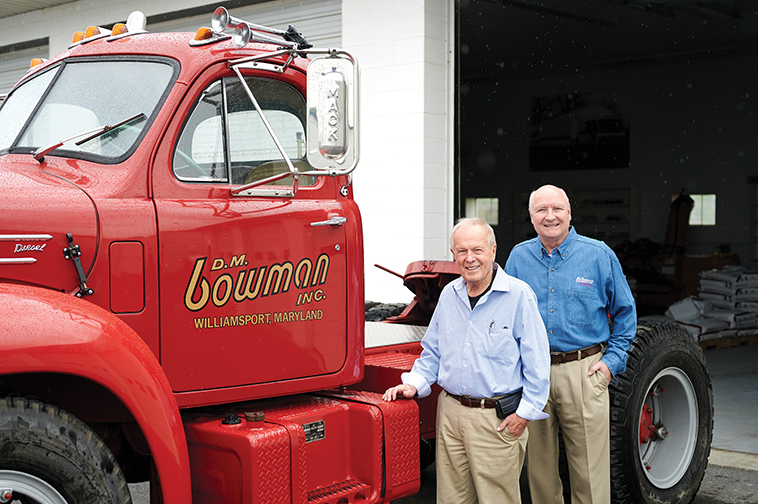
The Arkansas Department of Transportation and Tennessee Department of Transportation recently closed the 48-year-old Interstate 40 bridge between Arkansas and Tennessee as the result of a fractured beam. The bridge carries 35,000 to 45,000 vehicles a day, with trucks making up 25% to 29% of that volume. How does the closing of the bridge exacerbate the need for infrastructure improvement?
As an industry devoted entirely to interstate commerce and the delivery of freight, the I-40 bridge closure can and has dramatically affected that highly traversed freight corridor. In saying that, I believe the I-40 bridge represents yet another reason for a true investment into the Highway Trust Fund. My hope is that this scenario is the last one that our industry will face; however, the realist in me knows that 42% of all bridges are over 50 years old and 7.5% of the nation’s bridges are structurally deficient. Those numbers alone, coupled with the I-40 bridge example, demonstrated the very real need for Congress to move on infrastructure investment.
The Senate Environment and Public Works Committee (EPW) recently released a bipartisan draft of a new surface transportation law to replace the FAST Act at a cost of $303.5 billion. That would make it the largest surface transportation act in history as it is a 34% increase over the FAST Act, which passed in 2015. What are your thoughts on this legislation?
Well, just as it was last year, the Senate EPW Committee is only one step of many in this process of many that need to be taken regarding a new surface transportation law. The Senate Commerce Committee must also weigh in, as well as the House committees. While $303.5 billion is not a small amount of money, it represents the fact that the funding committees certainly must develop the mechanisms to be able to collect those dollars, which is the hard conversation that seems to plague any efforts to get something done on infrastructure.
The EPW legislation contains no money targeted at improving the shortage of truck parking. How serious an oversight would this be?
Let’s make note that EPW doesn’t really have a need to address this issue. Congressman Mike Bost (R-IL-12), who sits on the House Transportation and Infrastructure Committee, has introduced a bill to expand truck parking and make roads safer with some very real dollars attached to it, which TCA strongly supports. The bill itself is garnering some bipartisan backing — a rarity these days inside the beltway. If this issue fails to be addressed in the final package, it just goes to show how out of touch our representatives are when it comes understanding the scope and seriousness of this problem. The amount of lost productivity and frustration our commercial vehicle operators experience — let alone the risk associated with parking alongside the highway — is a big concern that cannot continue to be ignored.
Texas Republican Sen. John Cornyn recently suggested a truck-only vehicle miles traveled (VMT) tax that would levy a tax of 25 cents for every mile driven. The mileage would be tracked via government-mandated devices that report the data back to the IRS. What is the reaction of TCA to this suggestion?
Mandating the trucking industry bear the brunt of our nation’s infrastructure investment through a VMT tax is unacceptable. VMT enforcement mechanisms have not been implemented to prevent evasion, alleviate data privacy concerns, and address the security issues with this type of funding. Add that to the fact that any large-scale field test has yet to be conducted, paired with the very high cost of administrative fees that would be associated with this kind of revenue stream, this option certainly appears to be not yet ready for prime time. It does appear that as an industry and a nation, we are roughly five to 10 years out from the full development of the technology to generate the VMT revenue. We participated with 20 trucks in the first national mileage-based user fee (MBUF) truck pilot program earlier this year and encourage all carriers to begin getting involved in these programs so that our industry has the opportunity to shape the VMT conversation rather than stand by and let it happen.
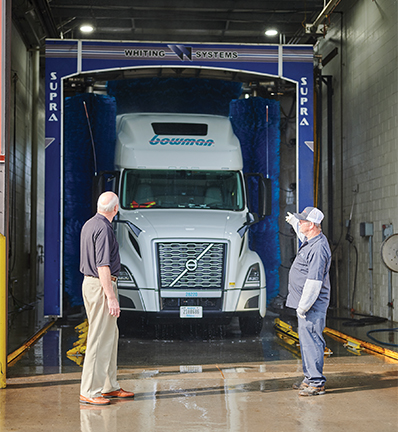
What do you think it is going to take to convince Congress to put to bed the idea of a VMT and instead move forward with an increase in the gasoline and diesel fuel tax to replenish the Highway Trust Fund?
I do not see the VMT concept disappearing from the conversation, but I do believe it’s going to require more time and research to determine a fair and equitable way of implementing it. I encourage our membership to make sure their voice is heard by contacting their representatives to make sure we are involved in the conversations around VMT. TCA supports the ATA-proposed solution to the highway funding crisis of the Build America Fund (BAF) that includes a new 20-cent per gallon fee built into the price (phased in 5-cent increments over four years) of transportation fuels collected at the terminal rack. The fee will be indexed to inflation and improvements in fuel efficiency, with a 5% annual cap. It is estimated that the fee will generate nearly $340 billion over the first 10 years.
As the Biden administration continues to promote the use of electric vehicles, from your perspective, what are some of the biggest challenges facing the trucking industry when it comes to electrification?
The current administration is moving an environmentally friendly agenda forward, and it is going to take all of us to remind our representatives of the significant progress we’ve made in the trucking industry over the last five to 10 years. There is no doubt electric vehicle development and testing is moving forward rapidly and will begin to be used in certain aspects of the business in the very near future. The challenges with electrification will be similar to what we generally experience with the introduction of any new technology: What’s the acquisition cost? Will the federal government provide incentives? Cost of ownership, maintenance requirements and tech training, commercial vehicle operator acceptance, etc. It was just a few short years ago I thought we would all be operating CNG or LNG equipment today.
Truckload 2021: Las Vegas is scheduled at the same time TCA would normally be holding its Call on Washington. Are there any plans to reschedule the Call on Washington?
The status of in-person visits on Capitol Hill continues to remain a question mark at best. It was with that knowledge that we convened and continue to schedule many virtual visits with Hill staff and representatives to discuss the issues that are important to the membership of TCA. The visits have worked out quite well, introducing new legislators to TCA and continuing the relationships that we have on the Hill with long-standing senators and representatives. As we climb out of the COVID-based environment, the transition to a September conference is proving itself to truly be a rewarding experience for the association and its members. I know we are planning big things for the fall and Truckload 2021, and everyone should begin making plans to attend now.
On a personal note, are you thoroughly enjoying your term as TCA chairman, and how has it impacted your professional and personal life?
It has been an awesome experience so far, and I look forward to seeing our members, suppliers, and officers live and in person soon. Thank you for your continued support.

Lyndon Finney’s publishing career spans over 55 years beginning with a reporter position with the Southwest Times Record in Fort Smith, Arkansas, in 1965. Since then he’s been a newspaper editor at the Southwest Times Record, served five years as assistant managing editor of the Arkansas Democrat-Gazette in Little Rock and from November 2004 through December 2019 served as editor of The Trucker. Between newspaper jobs he spent 14 years as director of communications at Baptist Health, Arkansas’ largest healthcare system. In addition to his publishing career he served for 46 years as organist at Little Rock’s largest Baptist church.

